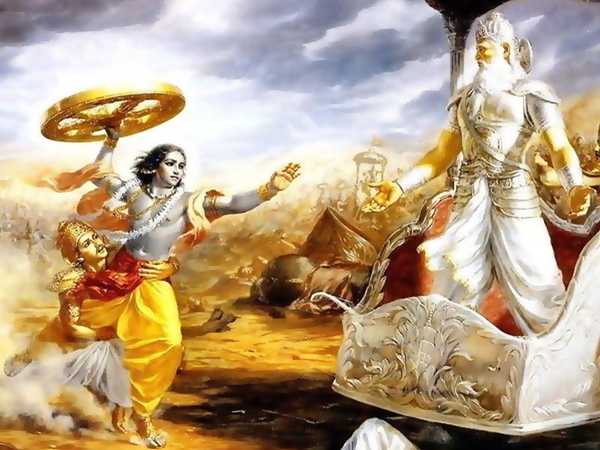Chapter 187

“Vaisampayana said, ‘Thus addressed by the Brahmanas, the Pandavas, OJanamejaya, proceeded towards the country of the southern Panchalas ruledover by the king Drupada. And on their way those heroes beheld theillustrious Dwaipayana–that Muni of pure soul, and perfectly sinless.
And duly saluting the Rishi and saluted by him, after their conversationwas over, commanded by him they proceeded to Drupada’s abode. And thosemighty chariot-fighters proceeded by slow stages staying for some timewithin those beautiful woods and by fine lakes that they beheld alongtheir way. Devoted to study, pure in their practices, amiable, andsweet-speeched, the Pandavas at last entered the country of thePanchalas. And beholding the capital, as also the fort, they took uptheir quarters in the house of a potter, Adopting the Brahmanicalprofession, they began to lead an eleemosynary life. And no menrecognised those heroes during their stay in Drupada’s capital.
“Yajnasena always cherished the desire of bestowing his daughter onKiriti (Arjuna), the son of Pandu. But he never spoke of it to anybody.And, O Janamejaya, the king of Panchala thinking of Arjuna caused a verystiff bow to be made that was incapable of being bent by any exceptArjuna. Causing some machinery to be erected in the sky, the king set upa mark attached to that machinery. And Drupada said, ‘He that will stringthis bow and with these well-adorned arrows shoot the mark above themachine shall obtain my daughter.’
“Vaisampayana continued, ‘With these words king Drupada proclaimed theSwayamvara. On hearing of them, O Bharata, the kings of other lands cameto his capital. And there came also many illustrious Rishis desirous ofbeholding the Swayamvara. And there came also, O king, Duryodhana and theKurus accompanied by Kama. There also came many superior Brahmanas fromevery country. And the monarchs who came there were all received withreverence by the illustrious Drupada. Desirous of beholding theSwayamvara, the citizens, roaring like the sea, all took their seats onthe platforms that were erected around the amphitheatre. The monarchentered the grand amphitheatre by the north-eastern gate. And theamphitheatre which itself had been erected on an auspicious and levelplain to the north-east of Drupada’s capital, was surrounded by beautifulmansions. And it was enclosed on all sides with high walls and a moatwith arched doorways here and there. The vast amphitheatre was alsoshaded by a canopy of various colours. And resounding with the notes ofthousands of trumpets, it was scented with black aloes and sprinkled allover with water mixed with sandal-paste and decorated with garlands offlowers. It was surrounded with high mansions perfectly white andresembling the cloud-kissing peaks of Kailasa. The windows of thosemansions were covered with net works of gold; the walls were set withdiamonds and precious costly carpets and cloths. All those mansionsadorned with wreaths and garlands of flowers and rendered fragrant withexcellent aloes, were all white and spotless, like unto the necks ofswans. And the fragrance therefrom could be perceived from the distanceof a Yojana (eight miles). And they were each furnished with a hundreddoors wide enough to admit a crowd of persons; they were adorned withcostly beds and carpets, and beautified with various metals; theyresembled the peaks of the Himavat. And in those seven-storied houses ofvarious sizes dwelt the monarchs invited by Drupada whose persons wereadorned with every ornament and who were possessed with the desire ofexcelling one another. And the inhabitants of the city and the countrywho had come to behold Krishna and taken their seats on the excellentplatforms erected around, beheld seated within those mansions those lionsamong kings who were all endued with the energy of great souls. And thoseexalted sovereigns were all adorned with the fragrant paste of the blackaloe. Of great liberality, they were all devoted to Brahma and theyprotected their kingdoms against all foes. And for their own good deedsthey were loved by the whole world.
“The Pandavas, too, entering that amphitheatre, sat with the Brahmanasand beheld the unequalled affluence of the king of the Panchalas. Andthat concourse of princes, Brahmanas, and others, looking gay at theperformances of actors and dancers (large presents of every kind ofwealth being constantly made), began to swell day by day. And it lasted,O king, several days, till on the sixteenth day when it was at its full,the daughter of Drupada, O thou bull of the Bharata race, having washedherself clean entered the amphitheatre, richly attired and adorned withevery ornament and bearing in her hand a dish of gold (whereon were theusual offerings of Arghya) and a garland of flowers. Then the priest ofthe lunar race–a holy Brahmana conversant with all mantras–ignited thesacrificial fire and poured on it with due rites libations of clarifiedbutter. And gratifying Agni by these libations and making the Brahmanasutter the auspicious formula of benediction, stopped the musicalinstruments that were playing all around. And when that vastamphitheatre, O monarch, became perfectly still, Dhrishtadyumna possessedof a voice deep as the sound of the kettledrum or the clouds, taking holdof his sister’s arm, stood in the midst of that concourse, and said, witha voice loud and deep as the roar of the clouds, these charming words ofexcellent import, ‘Hear ye assembled kings, this is the bow, that is themark, and these are the arrows. Shoot the mark through the orifice of themachine with these five sharpened arrows. Truly do I say that, possessedof lineage, beauty of persons, and strength whoever achieveth this greatfeat shall obtain today this my sister, Krishna for his wife.’ Havingthus spoken unto the assembled monarchs Drupada’s son then addressed hissister, reciting unto her the names and lineages and achievements ofthose assembled lords of the earth.'”




